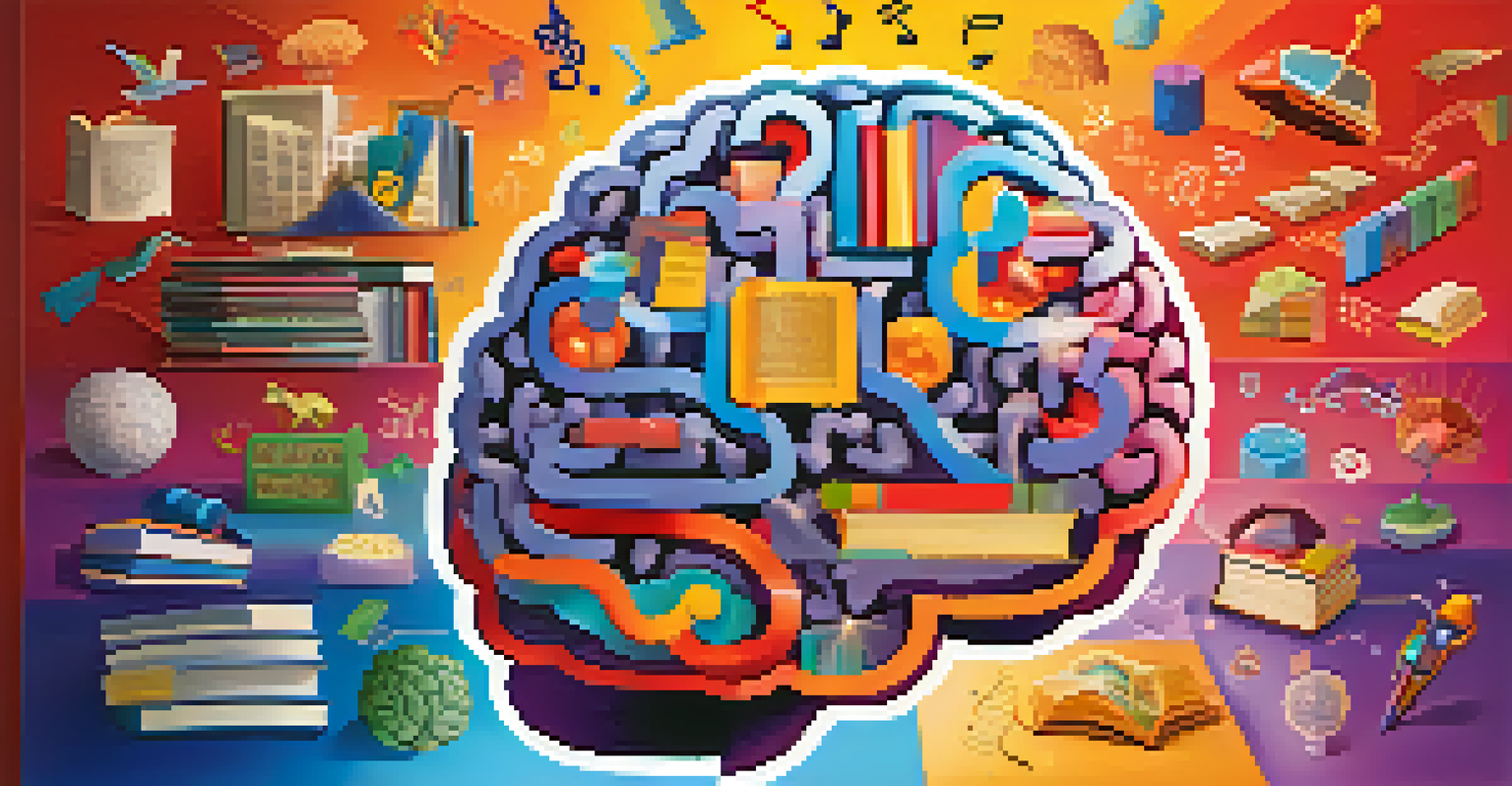Understanding Brain Aging: What to Expect Over Time

What is Brain Aging and Why It Matters
Brain aging refers to the gradual changes that occur in our brain as we get older. This process is natural and affects everyone, but understanding it can help us navigate the changes more effectively. Just as our bodies age, our brains undergo transformations that can impact memory, thinking, and overall cognitive function.
Aging is not lost youth but a new stage of opportunity and strength.
These changes can be likened to the wear and tear on a car over time. While some wear is expected, understanding the signs can help you maintain optimal performance. By knowing what to expect, we can better prepare ourselves to embrace this journey.
Ultimately, becoming aware of brain aging empowers us to take proactive steps in maintaining cognitive health, ensuring that we continue to thrive mentally and emotionally as we age.
The Stages of Brain Aging: What Happens Over Time
As we age, our brains typically experience several stages of change. In our 20s and 30s, we often enjoy peak cognitive performance, with memory and processing speed at their height. However, as we move into our 40s and beyond, subtle changes begin to emerge, such as occasional forgetfulness or slower information processing.

Much like a tree shedding its leaves in the fall, our brains may start to lose some connections between neurons. This doesn't mean we are losing intelligence; rather, it indicates a natural evolution in how we think and learn. It's essential to recognize these stages as part of a broader narrative of growth and adaptation.
Understanding Brain Aging Matters
Recognizing brain aging helps us navigate cognitive changes and maintain mental health as we grow older.
By understanding these stages, we can approach brain aging with curiosity rather than fear, adapting our lifestyles and habits to support our evolving cognitive landscape.
Common Cognitive Changes in Older Adults
Many people notice changes in their cognitive abilities as they age. Common experiences include slower recall, difficulty multitasking, or challenges with attention. These shifts can be disconcerting, but they are generally part of the normal aging process.
The greatest discovery of my generation is that a human being can alter his life by altering his attitude.
Imagine a library where some books are harder to find than others. This is similar to how our brains may sometimes struggle to access information, even though it’s still there. Recognizing this can help reduce anxiety around cognitive changes.
Moreover, understanding these common experiences fosters a sense of community. Many people share these challenges, and discussing them can lead to supportive conversations and strategies for coping.
Factors Influencing Brain Aging: Genetics and Lifestyle
Both genetics and lifestyle choices play a significant role in how our brains age. Genetic predispositions can influence everything from memory retention to the risk of neurodegenerative diseases. However, lifestyle factors such as diet, exercise, and mental stimulation can also have a profound impact.
Think of your brain like a garden: genetics may determine the type of plants that grow, but how you care for that garden will influence its health and vitality. Healthy habits, such as regular physical activity and a balanced diet rich in antioxidants, can help nurture cognitive function.
Cognitive Changes are Normal
Experiencing shifts in memory and processing speed is a natural part of aging and can be managed with awareness and support.
Ultimately, while we cannot change our genetic makeup, we can adopt lifestyle choices that promote brain health, giving us a sense of agency over the aging process.
The Role of Mental Stimulation in Cognitive Health
Engaging in mentally stimulating activities is crucial for maintaining cognitive health as we age. Activities such as reading, puzzles, and learning new skills can help strengthen neural connections and promote cognitive resilience. It's like giving your brain a workout, keeping it sharp and agile.
Just as physical exercise benefits our bodies, mental exercises can stave off cognitive decline. For example, learning a new language or taking up a musical instrument can challenge the brain and encourage new pathways.
Incorporating these activities into our daily routines not only enhances brain function but can also be a source of joy and fulfillment, enriching our lives as we age.
Emotional Well-Being and Brain Aging
Emotional well-being is closely linked to brain health, especially as we age. Changes in cognitive function can sometimes lead to feelings of frustration or sadness, making it essential to address our emotional needs. Keeping a positive outlook can significantly influence how we experience aging.
Think of emotional well-being as the sunlight that helps your garden flourish. When we nurture our emotional health through social connections, mindfulness, and self-care, we create an environment where our cognitive abilities can thrive.
Lifestyle Impacts Brain Health
Both genetics and healthy lifestyle choices, like diet and mental stimulation, significantly influence how our brains age.
Moreover, fostering emotional resilience empowers us to face the challenges of aging with grace and positivity, affirming that every stage of life has its own beauty and wisdom.
Practical Tips for Supporting Brain Health as You Age
Supporting brain health as we age involves a combination of lifestyle choices and daily habits. Simple practices, like staying physically active, eating a balanced diet, and maintaining social connections, can make a significant difference. These strategies can be easy to incorporate, much like adding a few extra vegetables to your meals each week.
Additionally, engaging in regular mental challenges, whether through games, puzzles, or learning, can keep your brain engaged and vibrant. Just as you would tune an instrument to keep it sounding its best, tuning your brain through daily mental exercises is key.

Ultimately, the journey of aging is one of adaptation and growth. By adopting these practices, we can nurture our brain health and embrace the richness that each age brings.